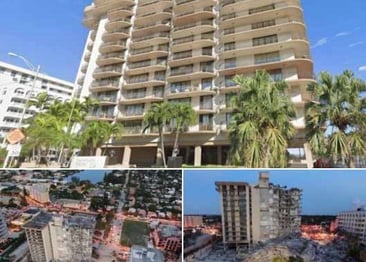Rembaum's Association Roundup
Just after midnight on Thursday, June 24, 2021, tragedy struck Surfside, Florida, when 55 of 136 units of the 12-story Champlain Towers South Condominium tragically crumbled to the ground. Just prior, a sleepless sixth floor owner notices a two-finger-wide separation in her drywall and, fearing the worst, scrambles downstairs as the building begins to collapse around her. Miraculously, she barely escapes. So many others were not as fortunate. Today, as this article is being written on June 27, 2021, sadly there are nine confirmed dead and over 150 persons still listed as unaccounted for.

By way of background, a prior building collapse in 1973 led Miami-Dade and Broward Counties to institute a city ordinance requiring a 40-year residential building recertification. The 40-year-recertification requirement is the absolute maximum period of time for the association to inspect the building for structural, electrical, and other critical component failure posing a threat to life safety. Champlain Towers South, built in 1981, was in the process of complying with its building recertification when disaster struck. Likely, months from now the cause will be identified. Do not be surprised if it is discovered that there were multiple causes leading to a perfect storm type of event.
When concrete is subjected to moisture, it causes the steel rebar to rust, which causes further expansion of the concrete surrounding the rebar, which ultimately, if not treated, leads to failure. This is commonly referred to as “spalling.” In addition, when concrete is exposed to moisture, it causes the concrete to separate into its constituent parts, and it will leach lime [calcium-containing inorganics]. Many condominium balconies experience concrete spalling and require repair. So, too, do the support columns and other parts of the foundation responsible to bear and pass the building load on to other structural components. What we know so far, from multiple sources, follows:
An engineering report issued on October 8, 2018, by Morabito Consultants to Champlain Towers South Condominium Association, Inc., concluded in its Structural Field Survey Report that
“[T]he waterproofing below the pool deck and entrance drive… is beyond its useful life and therefore it must be completely removed and replaced. The failed waterproofing is causing major structural damage to the concrete structural slab below these areas. Failure to replace the waterproofing in the near future will cause the extent of the concrete deterioration to expand exponentially… The main issue in this building structure is that the entrance drive, pool deck and planter waterproofing is laid on a flat surface. Since the reinforced concrete slab is not sloped to drain, the water sits on the waterproofing until it evaporates. This is a major error in the development of the original contract documents prepared by the [initial architects and engineers]… It is important to note that the replacement of the existing deck waterproofing will be extremely expensive as removal of the concrete topping slab to gain access to the waterproofing membrane will take time, be disruptive, and create a major disturbance to the occupants of this condominium building. Please note that the installation of deck waterproofing on a flat structure is a systemic issue for this building structure… Regarding the parking garage consultant’s review revealed signs of distress/fatigue as described below: abundant cracking and spalling of varying degrees was observed in the concrete columns, beams, and walls. Several sizable spalls were noted in both the top side of the entrance drive ramp and the underside of the pool/entrance drive/planter slabs, which included instances with exposed deteriorating rebar. Though some of the damage is minor, most of the concrete deterioration needs to be repaired in a timely fashion… Morabito Consultants is convinced that previously installed epoxy injection repairs were ineffective in properly repairing the existing cracked and spalled concrete slabs.”
(The entire 2018 Morabito Consultants report can be found at kbrlegal.com. Click “resources” at top of the page, then click “links” from the dropdown menu.)
Reports from local and national news indicated the following information. The swimming pool built atop a parking garage was leaking for an unknown period of time into the garage area below. Ocean water often intruded into the below-grade parking structure. At least one owner on the ninth floor was experiencing repeated pipe leaks. A report from the 1990s indicated the building was sinking approximately two millimeters per year. Significant roof repairs were underway for at least one month prior to the collapse. Lime was leaching out of the concrete deck causing damage to the cars in the parking garage below. Just south of the Champlain Towers South Condominium, a new building was being constructed that caused residents of the Champlain Towers South Condominium to complain about the constant shaking of their condominium building caused by blasting and digging activity. The concrete waterproofing associated with the foundation was failing as noted in the 2018 engineering report. Naturally, all of this combined could eventually lead to a weakened overall support structure.
Based on this information, ask yourself this important question: Was the Champlain Towers South Condominium collapse foreseeable? While some people, most especially with the benefit of hindsight, may believe that to be the case, bear in mind that there are also reports that the board had meetings with City of Surfside officials after the 2018 Morabito Consultants report was issued. If so, this may be very telling and bear on the board’s decision-making process. Details of such meetings are not presently known. Are there other engineering reports not yet discovered that bear on this issue? All of this may be very telling and bear on the board’s decision-making process. In any event, it is too early to reach conclusions.
Notwithstanding this horrible tragedy, there are interim lessons that can be gleaned from this disaster that every board member and manager of a high-rise condominium should heed, as follows:
- If your county does not have a 40-year-recertification requirement, and even if it does, obtain a recertification engineering report every 25 to 40 years, anyway. Remember that the 40-year requirement set out in the Miami-Dade and Broward ordinances is a maximum period that the association can go without having complied with the re-certification process. The 40 years is not a minimum, meaning an association can certainly have the recertification-type studies performed as often as reasonably necessary under the circumstances.
- When it comes to building maintenance and repairs that are life-safety recommendations, should the association’s retained engineering expert make recommendations regarding the building’s foundation, implement them in a timely manner. Do not consider making temporary patch repairs in lieu of proper repair. In other words, do not be penny wise and pound foolish. Do not let the need to obtain unit owner votes to either approve the work and/or the needed assessments or loans to fund the project be a factor in any way. There is a long line of Florida appellate case law that supports the board’s right to effectuate repairs and take out loans when necessary for protection of life and property. Your association’s attorney will be a necessary component of this process to provide legal opinions based on the controlling appellate cases.
- Fund the reserves appropriately and make sure the association has a specific reserve for concrete repair and restoration. If the association is pooling reserves, be sure to include concrete repairs in the pooled reserve. Do not even consider waiving or reducing reserves until a considerable nest egg is saved up.
- Update the association’s reserve schedules at least every five years. It should be based on empirical and objective evidence.
- Do not be afraid or otherwise hesitant to special assess the membership for required maintenance and repairs. Remember, the units have more financial value when the building is properly maintained.
Oddly, Florida Statutes have three significant failures that could help prevent a residential building collapse similar to the Champlain Towers South Condominium.
- The relevant statutes do not specifically require condominium associations to have a concrete restoration reserve though it should be easily included as a required reserve pursuant to “catch all” language set out in §718.112 (2)(f)(2), Florida Statutes (see below).
- Despite what you may hear on the news, there is not a statewide mandatory residential building recertification required after a certain number of years.
- There is no statutory requirement to have a reserve study or engineering study performed on a regular basis.
Regarding reserves, §718.112 (2)(f)(2), Florida Statutes (2020), provides, in relevant part, that
In addition to annual operating expenses, the budget must include reserve accounts for capital expenditures and deferred maintenance. These accounts must include, but are not limited to, roof replacement, building painting, and pavement resurfacing, regardless of the amount of deferred maintenance expense or replacement cost, and any other item that has a deferred maintenance expense or replacement cost that exceeds $10,000. The amount to be reserved must be computed using a formula based upon estimated remaining useful life and estimated replacement cost or deferred maintenance expense of each reserve item. The association may adjust replacement reserve assessments annually to take into account any changes in estimates or extension of the useful life of a reserve item caused by deferred maintenance. [Emphasis added.]
Remember, too, the board is absolutely required to pass the budget each year with reserves fully funded. Only then can the board decide to present to the owners the opportunity to waive or reduce reserves. Ask yourself, are our condominium association’s reserves properly funded?
As a result of this horrific tragedy, the 2022 Florida Legislature should consider requiring a recertification engineering report for all high-rise residential condominiums every 30 years or so and should require all community associations to update the reserve schedules at least once every five years.
Also remember that each board member should exercise his or her own individual reasonable business judgment when rendering decisions, except for the purchase of insurance, where the much higher standard of “best efforts” is applied as required by §718.111(11), Florida Statutes (2020). With the reasonable business judgment standard in mind, ignoring advice of engineers and other requisite professionals could be considered by others to be negligent or even rise to a reckless act or an omission conducted with bad faith, with malicious purpose or in a manner exhibiting wanton and willful disregard of human rights, safety, or property, any one of which can lead to exposure to liability. But, if the association received two different reports where the opinions drastically differ, then in that situation, each board member should use his or her reasonable business judgment to decide which report should be relied upon. The fact the board chose to follow one expert’s guidance over the other, whose guidance turned out in the end to be wrong, is not too likely to result in an award for damages as a result of legal challenge.
If you live in a high-rise condominium and are fearful of collapse due to the Champlain Towers South Condominium tragedy, please remember that this building’s failure was certainly not an everyday occurrence and is best described, for the time being, as a tragic anomaly.
(Reprinted with permission from the August 2021 edition of the Florida Community Association Journal)
Jeffrey Rembaum’s, Esq. of Kaye, Bender, Rembaum attorneys at law, legal practice consists of representation of condominium, homeowner, commercial and mobile home park associations, as well as exclusive country club communities and the developers who build them. Mr. Rembaum is a Certified Specialist in Condominium and Planned Development Law. He is the creator of ‘Rembaum’s Association Roundup’, an e-magazine devoted to the education of community association board members, managers, developers and anyone involved with Florida’s community associations. His column appears monthly in the Florida Community Association Journal. Every year since 2012, Mr. Rembaum has been selected to the Florida Super Lawyers list and was also named Legal Elite by Florida Trends Magazine. He can be reached at 561-241-4462.

